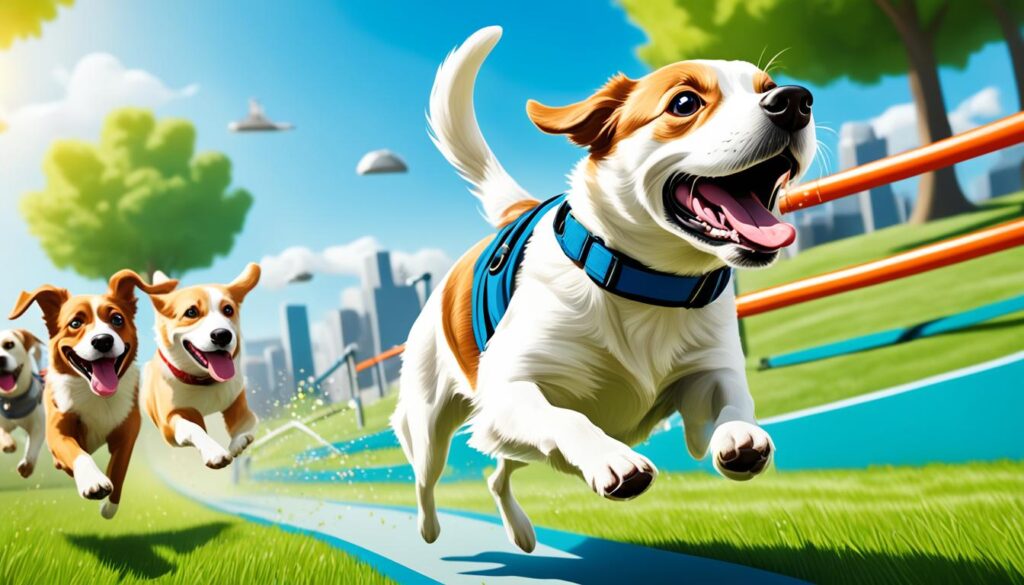Pawsitive Living: A Holistic Approach to Dog Health

Did you know that holistic pet wellness can significantly improve a dog’s health and well-being?
As dog owners, we strive to provide the best possible care for our furry friends. But what if there was a way to enhance their overall wellness naturally? That’s where a holistic approach to dog health comes in.
Inspired by Nutram’s philosophy, this guide explores the pillars of holistic pet wellness, including balanced nutrition, regular exercise, preventative veterinary care, mental and emotional well-being, grooming, and creating a safe environment. By incorporating these principles into our dogs’ lives, we can promote their long-term health and happiness.
Key Takeaways:
- Adopting a holistic approach to dog health can improve overall well-being naturally.
- Emphasize balanced nutrition, regular exercise, preventative veterinary care, mental and emotional well-being, grooming, and creating a safe environment.
- Nutrition plays a vital role in maintaining a dog’s overall health.
- Regular exercise supports physical and mental health, as well as bonding with your dog.
- Routine veterinary check-ups enable early detection and prevention of potential health issues.
Comprehensive Nutrition: The Cornerstone of Canine Health
Nutrition plays a vital role in maintaining a dog’s overall health. A balanced, nutrient-rich diet tailored to their specific needs is essential for their well-being. By prioritizing high-quality dog food with natural ingredients, you provide your furry companion with the necessary nutrients for a healthy lifestyle.
A balanced diet for dogs consists of proteins, fats, carbohydrates, vitamins, and minerals in the right proportions. These nutrients support their growth, development, and overall wellness. Natural ingredients ensure that your dog receives a wholesome meal without unnecessary additives or fillers.
When choosing dog food, look for well-rounded options that offer a complete nutritional profile. Nutram, for example, offers a range of dog food formulas that prioritize natural ingredients and provide the necessary nutrients for your dog’s optimal health.
Key Components of a Balanced Diet for Dogs:
- Proteins: Essential for muscle growth, repair, and overall body function.
- Fats: Provide energy, support healthy skin and coat, and aid in nutrient absorption.
- Carbohydrates: Offer a source of energy and fiber for digestive health.
- Vitamins and Minerals: Contribute to immune system function, bone health, and other vital processes.
By nourishing your dog’s body through proper nutrition, you contribute to their overall wellness. A healthy diet sets the foundation for a happy and vibrant life.
https://www.youtube.com/watch?v=WJ0kE3msQ5Y
| Nutrient | Function | Sources |
|---|---|---|
| Proteins | Building blocks for muscles, organs, enzymes, and hormones. | Meat, fish, poultry, eggs, legumes |
| Fats | Provide energy, aid in nutrient absorption, support skin and coat health. | Oils, fish, poultry, eggs |
| Carbohydrates | Source of energy, fiber for digestive health. | Whole grains, vegetables, fruits |
| Vitamins | Support immune function, promote overall health. | Fruits, vegetables, meat, fish |
| Minerals | Contribute to bone health, fluid balance, and other vital functions. | Meat, fish, dairy, fruits, vegetables |
The Vitality of Regular Exercise
To ensure the overall health and well-being of your canine companion, regular exercise is of utmost importance. Not only does exercise help dogs maintain a healthy weight, but it also plays a crucial role in promoting cardiovascular health, joint flexibility, mental stimulation, and bonding.
Cardiovascular Health: Just like humans, dogs need exercise to keep their heart and lungs strong. Regular physical activity increases blood flow, strengthens the heart muscles, and improves overall cardiovascular fitness. A healthy heart translates to a longer and happier life for your furry friend.
Mental Stimulation: Dogs are intelligent creatures that thrive on mental engagement. Exercise provides an excellent opportunity to stimulate their minds and prevent boredom. Whether it’s going for a stimulating walk in new environments, engaging in interactive play sessions, or participating in agility training, mental stimulation is essential for a well-rounded dog.
Bonding with Dogs: Exercise not only benefits your dog but also strengthens the bond between you and your furry companion. Engaging in outdoor activities together creates shared experiences, builds trust, and enhances the emotional connection between you and your dog.
To make sure your dog gets the most out of their exercise routine, tailor it to their individual needs and preferences. Some dogs may enjoy long walks or runs, while others may thrive on agility training or playtime at the park. Understand your dog’s unique requirements and create an exercise regimen that suits them best.
Making Exercise Fun and Safe
When engaging in physical activities with your dog, it’s essential to prioritize their safety and well-being. Consider the following tips:
- Start Slowly: If your dog is not used to regular exercise, gradually increase the intensity and duration over time to avoid strain or injuries.
- Use Proper Equipment: Ensure your dog is wearing a comfortable and well-fitted collar or harness with proper identification tags. Use a sturdy leash to maintain control during walks or outdoor activities.
- Stay Hydrated: Carry water and a collapsible bowl to keep your dog hydrated during exercise, especially on hot days.
- Vary the Routine: Keep your dog engaged by incorporating different activities and locations into their exercise routine. This helps prevent boredom and adds excitement to their physical activities.
“A tired dog is a happy dog.” – Unknown
In conclusion, regular exercise is vital for the overall well-being of your furry friend. It promotes cardiovascular health, mental stimulation, and emotional bonding. By tailoring the exercise routine to your dog’s individual needs and incorporating variety, you can ensure they stay healthy, happy, and full of vitality.
| Benefits of Regular Exercise for Dogs | Description |
|---|---|
| Cardiovascular Health | Regular exercise strengthens the heart muscles and improves overall cardiovascular fitness. |
| Mental Stimulation | Exercise provides mental stimulation, preventing boredom and improving cognitive function. |
| Bonding with Dogs | Engaging in physical activities together strengthens the emotional connection between you and your dog. |

Preventative Veterinary Care: A Pillar of Wellness
Routine veterinary check-ups play a vital role in proactive health management for dogs. By scheduling regular visits, pet owners can ensure the early detection and prevention of potential health issues, contributing to the overall well-being of their furry companions. These routine check-ups encompass a range of essential preventive care measures, including wellness exams, vaccinations, dental care, and discussions about nutrition, behavior, and any concerns.
During wellness exams, veterinarians assess a dog’s overall health and provide crucial guidance on maintaining their holistic wellness. They examine the dog’s body condition, weight, and vital signs and evaluate their ears, eyes, teeth, coat, and skin. By performing these thorough physical examinations, veterinarians can identify early signs of illness or abnormalities that may require further investigation.
“Routine veterinary check-ups enable pet owners to take a proactive approach towards their dog’s health, ensuring potential health issues are detected and addressed early on. By addressing prevention alongside holistic wellness, we can provide our canine friends with a higher quality of life.”
– Dr. Sarah Anderson, Lead Veterinarian at Nutram
In addition to wellness exams, preventative veterinary care includes vaccinations to protect dogs from common diseases and infections. Vaccinations are essential to prevent the onset of potentially life-threatening conditions and promote overall health and longevity.
Key Preventative Veterinary Care Measures
| Preventative Care Measure | Frequency |
|---|---|
| Wellness Exams | Twice a year for adult dogs |
| Vaccinations | As per Veterinarian’s recommendations |
| Dental Care | Regularly, as advised by the Veterinarian |
Another crucial aspect of preventative veterinary care is regular dental care. Oral health plays a significant role in a dog’s overall well-being, and dental problems can lead to systemic issues if left untreated. Veterinarians can provide guidance on dental hygiene practices, conduct professional cleanings and identify potential dental diseases or issues at an early stage.
Furthermore, routine veterinary check-ups offer the opportunity for pet owners to have open discussions with their veterinarians about nutrition, behavior, and any concerns they may have. This holistic approach ensures that dogs receive personalized care tailored to their individual needs, supporting their overall wellness journey.
Through preventive veterinary care, pet owners holistically address the health and well-being of their dogs, focusing on early detection and prevention of potential health issues. By prioritizing routine check-ups, vaccinations, dental care, and open communication with veterinarians, pet owners contribute to the long and happy lives of their beloved canine companions.
Mental Health and Emotional Well-being
The mental and emotional well-being of dogs is just as important as their physical health. Just like humans, dogs can experience stress, anxiety, and boredom, which can have a negative impact on their overall wellness. It is crucial to address their mental and emotional needs to ensure a happy and healthy life.
One way to promote mental stimulation and reduce stress in dogs is by engaging them in activities that challenge their minds. Training sessions, puzzle toys, and interactive games can provide mental exercise and keep their brains active. These activities not only keep them entertained but also help prevent behavioral issues that may arise from pent-up energy or boredom.
In addition to mental stimulation, providing a nurturing environment for your dog is essential for their emotional well-being. Shower them with love, attention, and positive reinforcement. Regularly spend quality time together through walks, cuddling, and playtime. Socialization is also crucial for dogs, as it allows them to interact with other animals and humans, boosting their confidence and reducing anxiety.
Remember, taking care of your dog’s mental and emotional health is a fundamental aspect of holistic pet wellness. By addressing their mental needs, providing stimulating activities, and encouraging socialization, you are enhancing their overall well-being and helping them live their best lives.
FAQ
Why is holistic pet wellness important for dog health?
Holistic pet wellness ensures the overall well-being of dogs by adopting a comprehensive approach to their health, addressing their physical, mental, and emotional needs.
How does nutrition contribute to a dog’s overall wellness?
Nutrition plays a vital role in maintaining a dog’s overall health. A balanced, nutrient-rich diet tailored to their specific needs supports their well-being, providing essential proteins, fats, carbohydrates, vitamins, and minerals.
Why is exercise important for dogs?
Exercise is essential for dogs to maintain a healthy weight, cardiovascular health, joint flexibility, and mental stimulation. It also strengthens the bond between dogs and their owners.
Why are routine veterinary check-ups necessary for dogs?
Routine veterinary check-ups contribute to proactive health management in dogs. These visits include wellness exams, vaccinations, dental care, and discussions about nutrition and behavior, enabling early detection and prevention of potential health issues.
How does mental and emotional well-being impact a dog’s overall health?
Mental and emotional well-being is integral to a dog’s overall health. Providing stimulating activities, a nurturing environment, and opportunities for socialization helps to prevent stress, anxiety, and boredom, which can adversely affect their well-being.